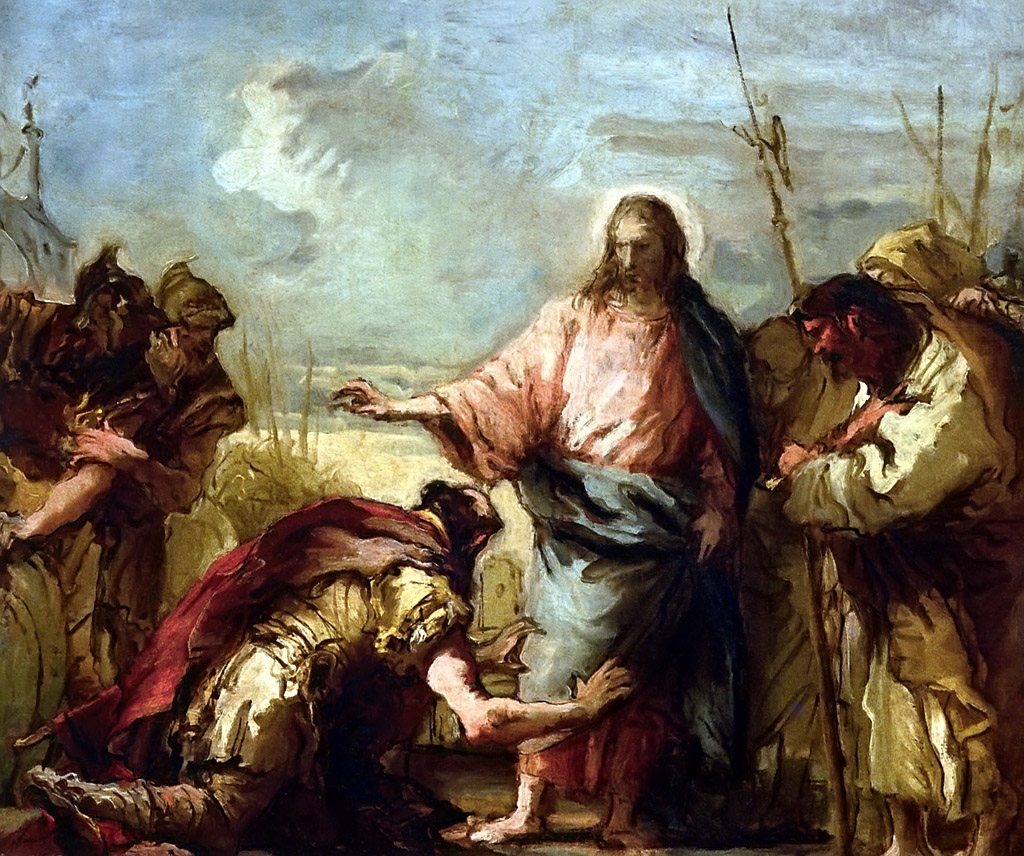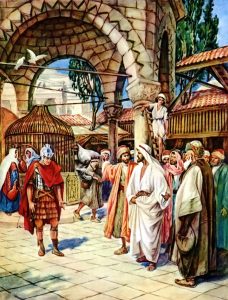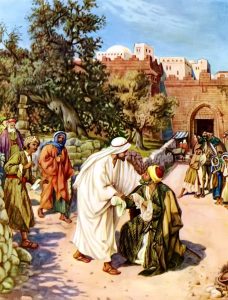
by Rev. Dr. Aric Fenske
Matthew 8:1-13 (ESV)
Jesus Cleanses a Leper

 When he came down from the mountain, great crowds followed him. And behold, a leper came to him and knelt before him, saying, “Lord, if you will, you can make me clean.” And Jesus stretched out his hand and touched him, saying, “I will; be clean.” And immediately his leprosy was cleansed. And Jesus said to him, “See that you say nothing to anyone, but go, show yourself to the priest and offer the gift that Moses commanded, for a proof to them.”
When he came down from the mountain, great crowds followed him. And behold, a leper came to him and knelt before him, saying, “Lord, if you will, you can make me clean.” And Jesus stretched out his hand and touched him, saying, “I will; be clean.” And immediately his leprosy was cleansed. And Jesus said to him, “See that you say nothing to anyone, but go, show yourself to the priest and offer the gift that Moses commanded, for a proof to them.”
The Faith of a Centurion
When he had entered Capernaum, a centurion came forward to him, appealing to him, “Lord, my servant is lying paralyzed at home, suffering terribly.” And he said to him, “I will come and heal him.” But the centurion replied, “Lord, I am not worthy to have you come under my roof, but only say the word, and my servant will be healed. For I too am a man under authority, with soldiers under me. And I say to one, ‘Go,’ and he goes, and to another, ‘Come,’ and he comes, and to my servant, ‘Do this,’ and he does it.” When Jesus heard this, he marveled and said to those who followed him, “Truly, I tell you, with no one in Israel have I found such faith. I tell you, many will come from east and west and recline at table with Abraham, Isaac, and Jacob in the kingdom of heaven, while the sons of the kingdom will be thrown into the outer darkness. In that place there will be weeping and gnashing of teeth.” And to the centurion Jesus said, “Go; let it be done for you as you have believed.” And the servant was healed at that very moment.
What is a human being? And what gives a human being value that it should be sanctified and granted dignity and compassion at every stage or level of development? You would think that the answer to the first question would be a no-brainer. We all know what a human being is. Or do we? In today’s secular world, there is no real consensus on this. Some would argue that human beings are nothing more than highly evolved animals. The only difference between you and an octopus is chance and luck. Therefore, they would argue that you are no more valuable than an octopus and should be treated no differently. According to this line of thinking, there’s no problem with killing an unwanted baby, or a teenager with Down syndrome, or a 65-year-old with stage 4 cancer. If a person causes an unwanted burden or becomes a drain on society, they can be disposed of as one would dispose of the unwanted dogs in the pound. However, I think some people today would be more likely to kill a human being than a dog, which is both sad and ironic at the same time.
On the other end of the spectrum, you have those who argue that humans are different from animals, and what makes them so is their intellect, will, and self-recognition. We can think and reason and have feelings; therefore, we are different from and better than the animals. The mind and the will—that is what matters to this group. To them the body is just a clump of cells to keep the mind going. But then, what about the unborn or those with severe mental disorders or those in comas? Can they think? Do they still have reason? There are many who would argue, no. And since they can’t think or reason or exercise their will, they aren’t really human. And since they aren’t human, they don’t need to be treated as such.
But God reveals a different answer. A human being is not just a more developed animal. Nor is a human being defined simply by the ability to reason or think or exercise free will. A human being is God’s handiwork, made in God’s own image as having both a body that has been designed by God for a purpose and a rational mind. We are not one or the other; we are both. And both have been carefully made by God in His image. Therefore, each person who has been born according to the design of God is already endowed with worth and dignity and falls under the protection of the Fifth Commandment to not commit murder and under the guidance of the First Commandment, that God alone is God and therefore is the only One with the authority to decide when life begins and ends. And since God designed life to sprout forth from the joining of male and female DNA, that means that from natural conception to natural end, all life belongs to God.
Thank the Lord, we have made progress on the issue of abortion. There’s actually a chance that we might see Roe v. Wade overturned in our lifetime. But still, we must push on. Abortion isn’t the only issue. The push for doctor-assisted suicide is growing. The push for genetic testing on embryos to destroy those with unwanted traits is growing. Besides, we know that there’s always the chance that if Roe v. Wade is overturned, it could just be reversed again down the road. We can’t just push for these things to be declared illegal; we must fight for them to become unthinkable. And for that to happen, they must first be unthinkable to us. We will probably never convince the unbelievers on the basis of the Bible; they don’t believe it anyway. But we should be convinced by the Bible and directed by it in how we think about these issues.
And that leads us to Jesus and the Gospel. We know that God has made us in His image and endowed us with dignity and even certain unalienable rights as our own founding fathers once recognized. But let us Christians never forget that Jesus has also redeemed us because we are made in God’s image. Jesus has bestowed even more worth and dignity upon us because He became one of us and died to save us. He has forgiven our sins and has risen again from the dead to save both body and soul for all eternity. He paid with His divine blood to have us as His own, which makes us all of infinite value.
And who has He done this for? For all those created in God’s image. And lest we try to wriggle around this, the Gospels have provided the wonderful examples that we had before us today.
“Behold, a leper came to him and knelt before him, saying, ’Lord, if you will, you can make me clean.’ And Jesus stretched out his hand and touched him, saying, ’I will; be clean.’”
Remember, lepers were considered unclean. Nobody would even go near these people because they didn’t want to become unclean through contacting them. And, as we see in other places, the Jews had the idea that diseases like this were a result of a person’s own sin—kind of a life karma. So most other people would have thought this leper was simply getting what he deserved. Nobody else would have considered his life worth saving, probably not even Jesus’ disciples.
So, think of how shocking this whole episode must have been. The leper asks Jesus if He is willing to help him, and Jesus not only replies that He is willing, but He touches him! Jesus touches a leper. Jesus was willing to become unclean so that the leper could be healed. This man’s life was worth so much to Jesus that Jesus was willing to essentially take his place.
Which is really true of every person. Having just come out of the Christmas season, how could we not recognize that Jesus has given worth to all people, in every stage or condition of life, by becoming man Himself and going through every stage of life to be our Savior?
Jesus was conceived and grew inside His mother’s womb. And let’s not forget that He was worshipped as the Savior inside His mother’s womb! Jesus gave worth to the unborn by becoming one! He became gross and despised to save the gross and despised. As we heard today, He became unclean to save the unclean. He died to save the dying. There is no person or group of people that Jesus hasn’t identified with. There is no category of person which Jesus finds unfit to live or unworthy of His care or protection. Not even His enemies and those who hate Him.
That becomes clear in the second miracle we heard about today. Jesus healed a centurion’s servant. What’s a centurion? It’s a commander in the Roman army. Don’t forget that the Jews hated the Romans! The Jews saw the Romans as a plague on their nation. They wanted them out! And here is a leader in their army. Not only is this a Gentile, outside of God’s covenant, but he’s actively suppressing God’s people.
And when he comes to Jesus for help, Jesus helps! Jesus doesn’t say, “Tough luck, get lost.” He doesn’t make excuses about why it would be acceptable to not love him or feel compassion for him. Jesus sees this man as one created in God’s image and stuck in slavery to sin and therefore in need of His help. This would have been just as shocking to the apostles as if we heard that Nancy Pelosi was going to personally pay for Donald Trump’s hospital bills! I say this because the topic of the sanctity of life also touches on immigration. Yes, I know what’s happening at Ft. McCoy with the refugees. Yes, many are Muslims. Yes, some people from there are or were terrorists. And Jesus created and redeemed them, too.
This is all good news for us, of course. It is for this reason that we can be certain of our own salvation. No matter how good or worthy we think we might be, we are no more worthy of God’s mercy than any other. The very fact that we’d argue about why other people are unfit to live is all the proof we need to show that we are just as broken and sinful as anybody else. And yet, Christ becomes man and takes our place under sin to deliver us. If He saved the leper and had compassion on the Gentile soldier, His compassion certainly falls on us, too.
But all of this also instructs us on Christian morality, and it removes all of our excuses for why we might think some people’s lives may not matter. Every life is created in God’s image. And every life was redeemed by Jesus. He came in the flesh of every person and identified Himself with every person and died in the place of every person. This makes all life precious to God—from the unborn to the refugee to the disabled and dying. And it makes them precious to us. May we love them and care for them all as Jesus does. Amen.
Rev. Dr. Aric Fenske is pastor at Grace Lutheran Church and Trinity Lutheran Church of Bear Creek, Wisconsin.